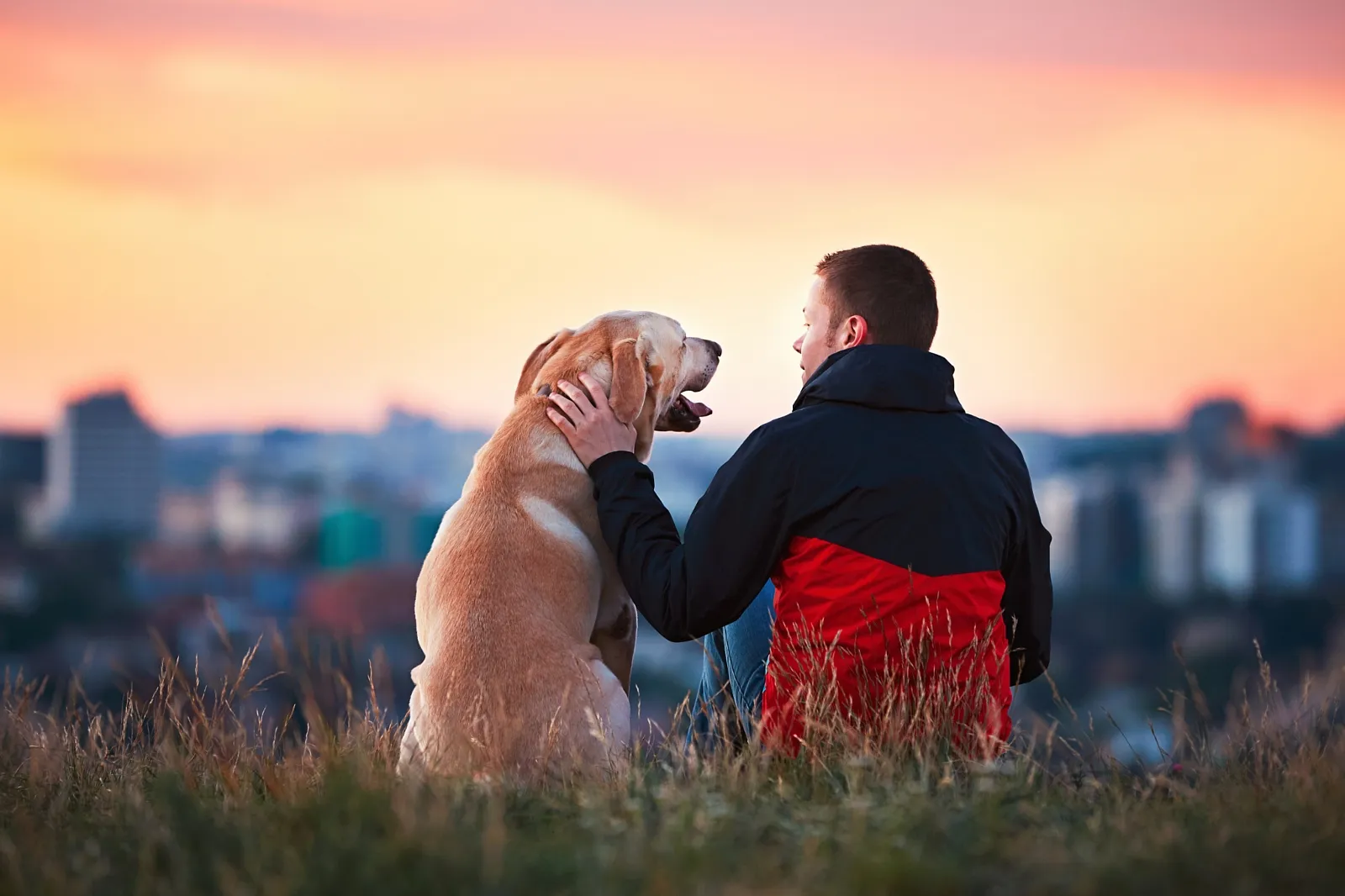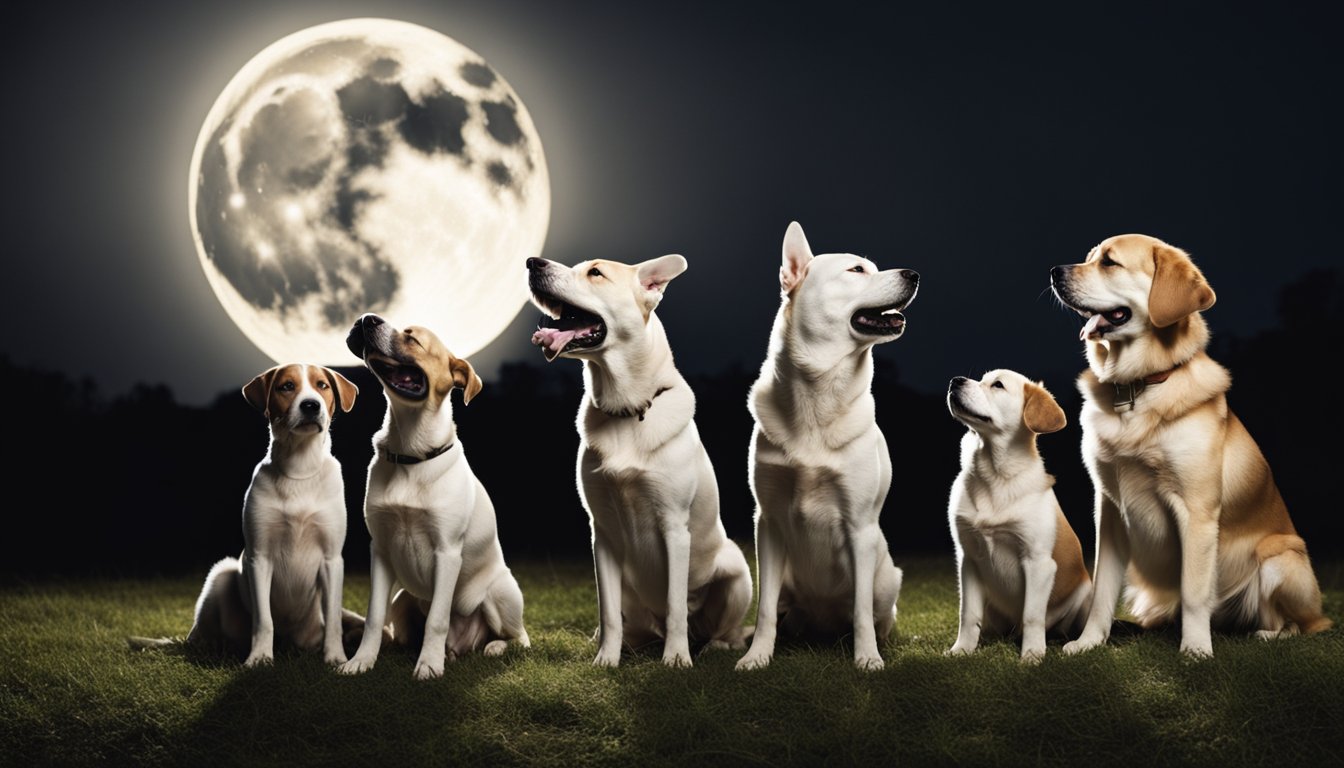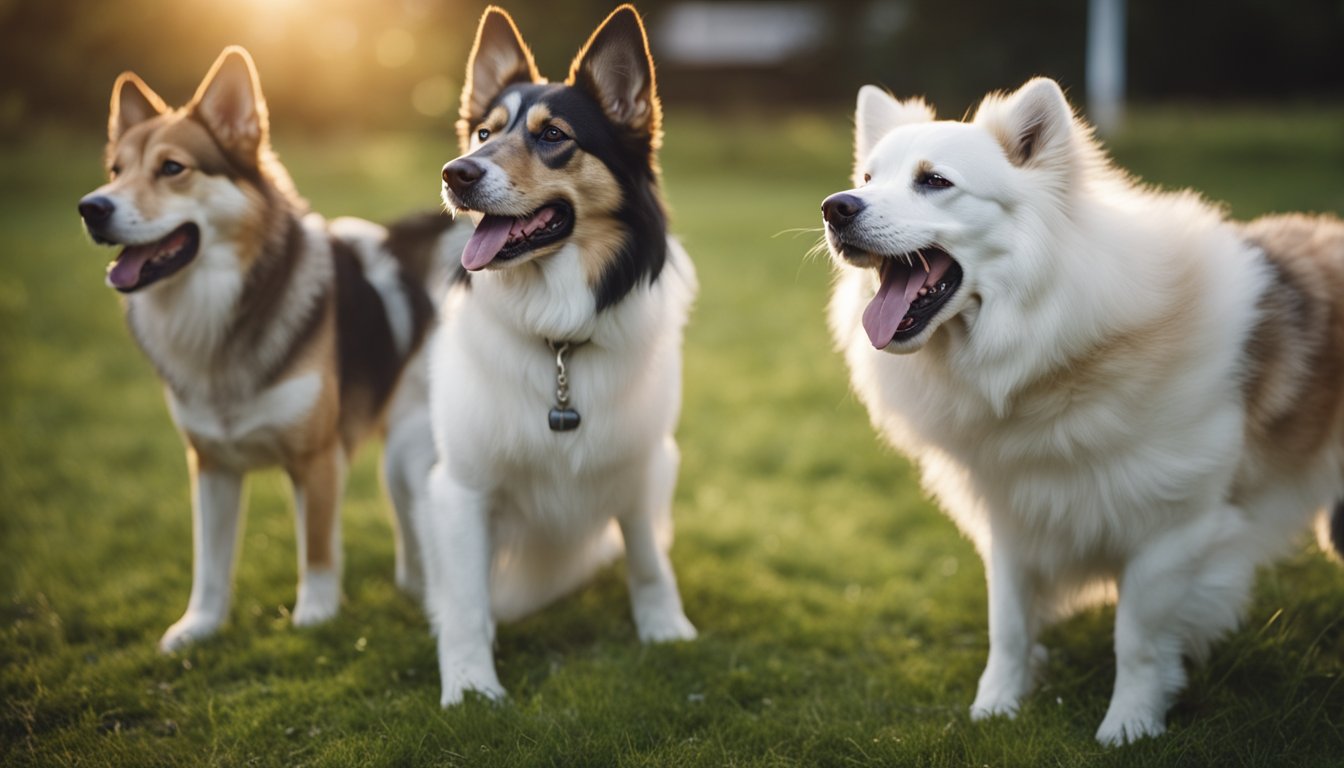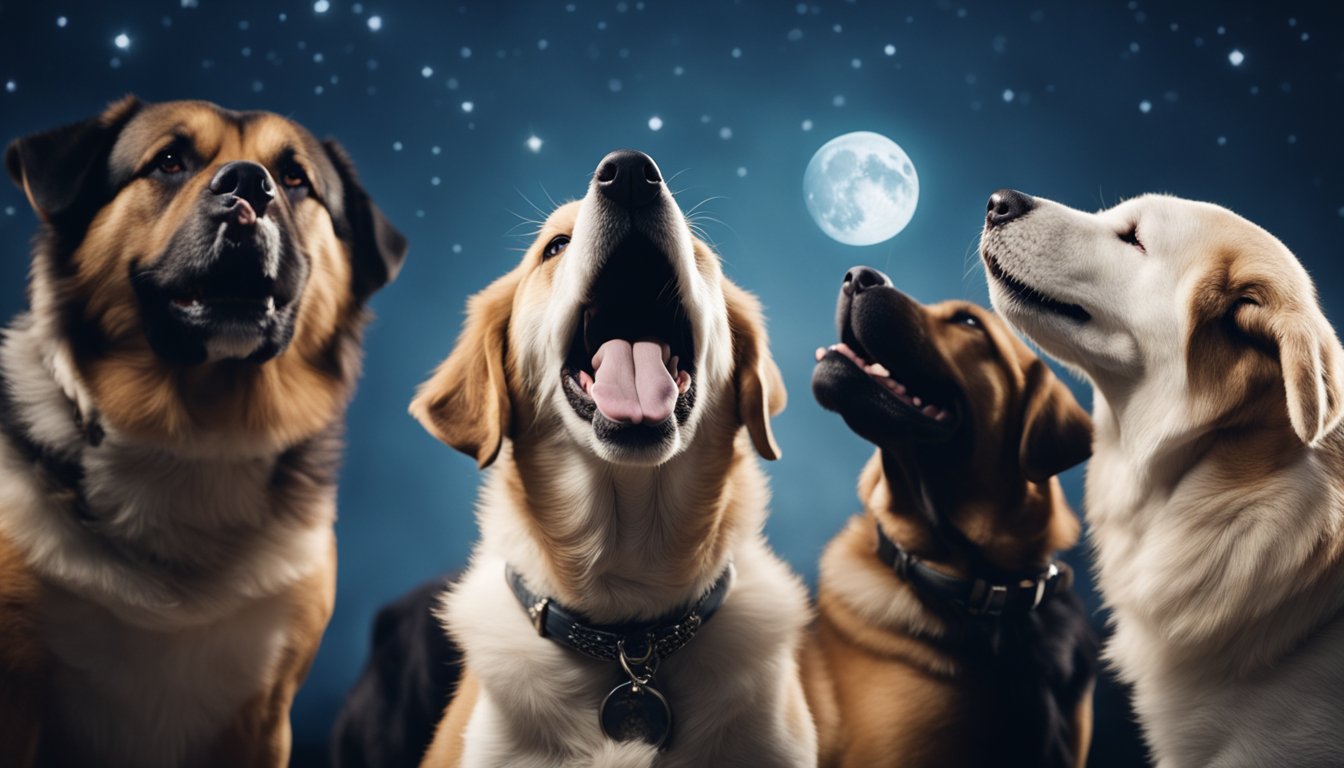If you are a dog owner, you have probably heard your furry friend howling at some point. But have you ever wondered why dogs howl? While howling can be a beautiful and unique sound, it can also be a sign of distress or a way for dogs to communicate with each other.
Understanding dog howling can help you better communicate with your furry friend and address any issues that may arise. Different breeds may howl for different reasons, and it is important to understand the behavior of your specific breed. For example, hound dogs are known for their howling as it is an instinctual behavior that they use to communicate with other dogs while hunting.
If your dog is howling excessively, it may be a sign of separation anxiety, boredom, or even a medical issue. Addressing excessive howling can help improve your dog’s behavior and overall well-being. Additionally, howling can be a way for dogs to bond with their human companions, as they may howl in response to their owner’s voice or music. In this article, we will explore the reasons why dogs howl and what you can do to address excessive howling.
Key Takeaways
- Understanding your dog’s breed can help you understand their howling behavior.
- Excessive howling may be a sign of distress or a medical issue.
- Howling can be a way for dogs to bond with their human companions.
Understanding Dog Howling
https://www.youtube.com/watch?v=TvfHCXMUjyU&embed=true
If you’re a dog owner, you may have heard your furry friend howl at some point in time. While it may seem like a strange and eerie sound to us, howling is actually a normal and natural behavior for dogs. In this section, we’ll explore the reasons behind why dogs howl and what it means for your furry friend.
Historical and Ancestral Context
Dogs are descended from wolves, and howling is an ancestral instinct that has been passed down through generations. In the wild, wolves use howling as a form of communication to announce their presence, contact other members of their pack, and establish territory. Similarly, domesticated dogs use howling as a way to communicate with their owners and other dogs.
Howling as a Form of Communication
Dogs use a variety of vocalizations to communicate, and howling is just one of them. Howling can indicate a range of emotions, including stress, anxiety, separation anxiety, distress, depression, fears, and phobias. It can also be a sign of excitement or happiness, especially when your dog is howling along with you or in response to a high-pitched sound like a musical instrument or a siren.
Emotional Aspects of Howling
Howling can also be an emotional release for dogs, especially when they are feeling lonely or isolated. Some dogs may howl when left alone for long periods of time, as a way to express their sadness or frustration. If your dog is howling excessively or seems to be in distress, it’s important to consult with your veterinarian to rule out any underlying health issues.
Howling in Response to Triggers
Dogs may also howl in response to specific triggers, such as the sight of the moon or other dogs howling. This behavior is known as contagious howling and is common in dogs who live in urban areas, where your dog is more likely to hear the sound of other pups. If your dog is howling excessively in response to triggers, it may be a sign of anxiety or stress, and you should consult with your veterinarian to determine the best course of action.
In summary, howling is a natural and normal behavior for dogs, and it can indicate a range of emotions and needs. By understanding the reasons behind why dogs howl, you can better communicate with your furry friend and provide them with the support and care they need.
Howling Behavior in Different Breeds
Dogs have been howling for centuries, and it’s a behavior that is deeply ingrained in their DNA. Some breeds are more prone to howling than others, and it’s important to understand the reasons behind this behavior. Here’s a breakdown of howling behavior in different breeds.
Howling in Hound Breeds
Hound breeds such as Beagles, Dachshunds, and Basset Hounds are known for their howling behavior. These breeds were originally bred for hunting, and howling was a way for them to communicate with their pack during a hunt. Howling also helped hunters locate their dogs in dense forests. Beagles, in particular, are known for their distinctive howl, which can be heard from miles away. If you have a hound breed, expect them to howl when they are excited, bored, or want attention.
Howling in Non-Hound Breeds
While hound breeds are the most well-known for their howling behavior, other breeds such as Alaskan Malamutes, American Eskimo Dogs, and Huskies also have a tendency to howl. These breeds were originally bred for work, and howling was a way for them to communicate with their owners or other dogs. Alaskan Malamutes and Huskies, in particular, are known for their howling behavior, which is similar to that of wolves. If you have a non-hound breed that likes to howl, it’s likely because they are trying to communicate with you or other dogs.
In conclusion, howling behavior is a natural instinct for dogs, and some breeds are more prone to it than others. If you have a breed that is known for howling, it’s important to understand the reasons behind their behavior and to provide them with plenty of mental and physical stimulation to prevent excessive howling.
Addressing Excessive Howling
https://www.youtube.com/watch?v=f_NaB9vXZyA&embed=true
If your dog is howling excessively, it can be a sign of an underlying problem that needs to be addressed. Here are some steps you can take to address excessive howling:
Identifying the Problem
« Don’t Feed Your Golden Retrievers Store-Bought Food! Discover the Ultimate Homemade Meal Plan for Happy and Healthy Goldens
Lumps in Golden Retrievers: Understanding the Causes and Treatment Options »
The first step is to identify the cause of your dog’s excessive howling. Is your dog lonely or in trouble? Is your dog sick or injured? Is your dog reacting to something in the environment? Once you identify the problem, you can take steps to address it.

Training and Behavior Modification
Training and behavior modification can be effective in reducing excessive howling. Teach your dog quiet behavior and reward them with treats when they are quiet. Ignore your dog when they howl and only give attention and treats when they are quiet. Counterconditioning and desensitization can also be effective in reducing excessive howling.
When to Seek Professional Help
If your dog’s excessive howling persists despite your efforts, it may be time to seek professional help. A certified professional dog trainer, certified applied animal behaviorist, veterinary behaviorist, or board-certified veterinary behaviorist can help you address the underlying problem and develop a behavior modification plan.
Remember, excessive howling can be a sign of medical issues or other problems, so it’s important to rule out any underlying medical issues before addressing the behavior. If you suspect your dog is howling due to a medical issue, consult with your vet or DVM.
Howling and the Human-Dog Bond
As a pet parent of a domesticated dog, you may have heard your furry friend howl on occasion. While this instinctual behavior may seem strange to us, it is a natural way for dogs to communicate and bond with their pack, which includes you. In this section, we will explore how howling can strengthen the bond between you and your furry friend.
Howling as a Social Activity
Dogs are social animals and thrive on interaction with their owners and other dogs. Howling is one way that they express their social nature. When your dog hears you howling, they may join in to show that they are part of your pack. This can be a fun and bonding experience for both you and your furry friend.
How Dogs Use Howling to Communicate with Humans
Dogs use howling to communicate with their owners in a variety of ways. For example, if your dog is in pain, they may vocalize their discomfort through howling. Additionally, dogs may howl to protect their pack and territory from perceived threats, such as predators or strangers.
Another reason why dogs howl is to get your attention. If your furry friend wants to play, go for a walk, or receive a reward, they may howl to get your attention. Tilted heads and whining are other ways that dogs communicate their needs and desires to their owners.
Dealing with Howling in a Residential Setting
While howling can be a natural and bonding behavior, it can also be annoying for your neighbors, especially if your furry friend howls at night. If your dog howls excessively, it may be a sign of separation anxiety or other underlying issues.
To deal with excessive howling, it is important to identify the underlying cause. If your furry friend is howling due to boredom, providing them with toys and other forms of entertainment may help. Additionally, training your dog to speak on command and rewarding them for quiet behavior can help reduce excessive howling.

In conclusion, while howling may be annoying at times, it is a natural and instinctual behavior for dogs. By understanding why dogs howl and how they use it to communicate with their owners, you can strengthen the bond between you and your furry friend.
Frequently Asked Questions
Why do dogs howl at 3am?
Dogs are crepuscular animals, which means they are most active during dawn and dusk. However, some dogs may howl at 3 am because they are bored, anxious, or have some medical issues. If your dog is howling at 3 am, make sure they have enough physical and mental stimulation during the day. Also, check if they have any medical issues that may cause discomfort or pain.
Why do dogs howl in the morning?
Dogs may howl in the morning to communicate with their owners or other dogs. They may also howl to express their excitement or to greet the new day. Some dogs may howl in the morning because they are hungry, so make sure your dog has enough food and water before bedtime.
Why do dogs howl at music?
Dogs may howl at music because they are trying to sing along. Some dogs may find certain types of music more appealing than others, and they may howl to express their enjoyment. However, some dogs may howl at music because it hurts their ears, so make sure you keep the volume at a reasonable level.

Why do dogs howl at high pitched sounds?
Dogs have a better hearing range than humans, and they may howl at high pitched sounds because they are more sensitive to them. Some dogs may howl at high pitched sounds because they are scared or anxious. If your dog is howling at high pitched sounds, try to remove the source of the sound or distract your dog with a toy or treat.
Why do dogs howl at the moon?
Contrary to popular belief, dogs do not howl at the moon. They may howl at night because they are more active during that time, and they may hear other dogs or animals howling in the distance. Howling is a form of communication for dogs, and they may howl to establish their territory or to attract other dogs.
What is the purpose of howling?
Howling is a natural behavior for dogs, and it serves several purposes. Dogs may howl to communicate with other dogs or their owners, to express their emotions, or to establish their territory. Howling is also a way for dogs to relieve stress and anxiety. If your dog is howling excessively, it may be a sign of an underlying issue, so make sure you consult with your veterinarian.










